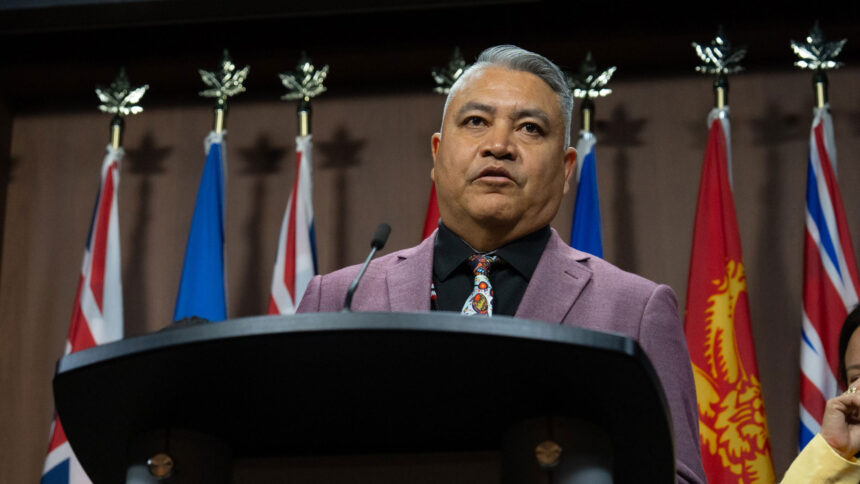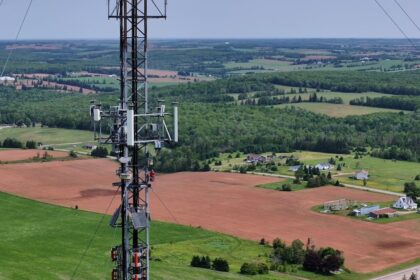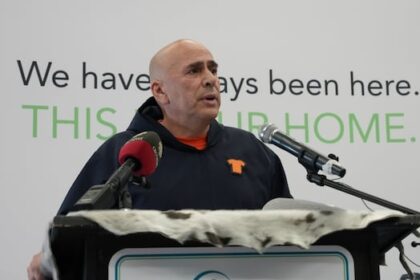The regional chief of the Assembly of First Nations in British Columbia says “free, prior and informed consent” does not necessarily equate to a veto power for individual First Nations over specific development projects. “No government has a veto,” said Terry Teegee at a news conference in Ottawa Wednesday morning, “Meaning that when we come to a decision, all governments come into a room to make a decision together and I think First Nations certainly, as part of this, need to be part of the decision-making process.” Proper consultation with Indigenous groups before governments and industry move ahead with economic development projects that affect their lands is a key tenet of the United Nations Declaration on the Rights of Indigenous Peoples, or UNDRIP, which Canada formally adopted into legislation in 2021. Consultation with Indigenous Peoples on development projects has been in the spotlight in recent weeks as Prime Minister Mark Carney moves to fast-track the approval process for energy pipelines and other nation building projects. Laying the foundations for Canadian economic sovereignty in the face of tariff and annexation threats from U.S. President Donald Trump was also a key component of the Liberal election campaign. On June 6, the Liberals introduced the One Canadian Economy: An Act to Enact the Free Trade and Labour Mobility in Canada Act and the Building Canada Act or Bill C-5. The legislation seeks to streamline the approval process of what are deemed to be economic projects in the “national interest” through one office and decrease the evaluation time from five to two years. It gives the federal cabinet sweeping powers to sidestep laws, including environmental protections, if the government believes it may affect the project. While the bill mentions consultation with Indigenous Peoples, it doesn’t define what is considered consultation. First Nations complain the government has been moving too quickly. “It’s probably going to take a lot longer to get approval for some of these projects because we’re going to end up in court,” Teegee said. “This is where we end up.” The government said it shared background information on the Bill C-5 to dozens of “Indigenous partners” on May 23, ahead of the legislation being tabled in the House of Commons. It also said it asked for feedback. Some said they received a copy and were asked for comments just days before the government moved the bill in Parliament. “We’ve always stood forward and helped Canada but at the same time when there’s bills being rammed through that could affect our rights and we just got the bill on Friday – we need time, of course, to legally review it, politically review it as well and we’re not being given that time,” AFN National Chief Cindy Woodhouse Nepinak, who was also at the Ottawa press conference, said. ‘They want to push through this legislation right to the end of this month and I think that that’s the wrong way to go,’ says AFN National Chief Cindy Woodhouse Nepinak. Photo: Charlie Woolf/APTN. Teegee said he believes an agreement can be reached on major economic projects if all parties take the necessary time to build consensus. In certain cases, it may be necessary to defer to an independent dispute resolution panel or mechanism, he said. At the same time, Teegee said First Nations are fully aware that Canadian governments have historically used terms like “national interest” as a means of bypassing Indigenous rights altogether. “We’re in the middle of a tariff war and there’s external pressures upon Canada, British Columbia and what have you – where there’s a big push for many of these projects,” he said. “However, far too often we’ve seen this in British Columbia, we’ve seen it in Canada as well that it’s at the expense of our rights, title and interests.” Read More: Carney’s project legislation threatens the climate, democracy and Indigenous rights says Elizabeth May First Nations leaders will be holding a virtual meeting this coming Monday on Bill C-5 and what it could mean for their communities. Assembly of First Nations National Chief Cindy Woodhouse Nepinak was hesitant to talk about specific items that may be on the agenda. She did reiterate Carney’s commitment to get the legislation passed through Parliament before the House of Commons rises for the summer does not allow time for proper consultation. “They want to push through this legislation right to the end of this month and I think that that’s the wrong way to go,” she said. “Even though they (the federal government) have committed to meet with First Nations leadership, they’ve committed to that for this summer – the prime minister himself will meet with chiefs. “I think you need to do that before you pass any legislation. So that they can have input.” Continue Reading
AFN says while no government has veto over resource projects, Canada needs to properly consult on national energy legislation

Leave a Comment










